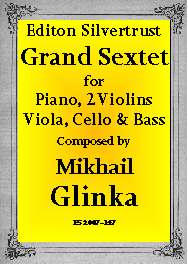Presents
Mikhail Glinka
Grand Sextet for Piano, String Quartet & Bass in E flat Major
 The
Grand Sextet in E flat dates 1832 during a period in which Glinka was
residing in Milan and preoccupied with the idea writing an opera. Taking in an
opera at La Scala as often as he could, Glinka came under the thrall of several
Italian composers, in particular Donizetti. He later related that the piano
part to the Sextet was written with his Italian doctor’s daughter in mind. He
had been infatuated with her, and though an amateur, she was a brilliant pianist
with a sparkling technique. As for the melodic content and overall structure,
the influence of Italian opera can be felt throughout, but especially in the
middle movement.
The
Grand Sextet in E flat dates 1832 during a period in which Glinka was
residing in Milan and preoccupied with the idea writing an opera. Taking in an
opera at La Scala as often as he could, Glinka came under the thrall of several
Italian composers, in particular Donizetti. He later related that the piano
part to the Sextet was written with his Italian doctor’s daughter in mind. He
had been infatuated with her, and though an amateur, she was a brilliant pianist
with a sparkling technique. As for the melodic content and overall structure,
the influence of Italian opera can be felt throughout, but especially in the
middle movement.
Mikhail Glinka (1804-57) is commonly regarded as the founder of Russian nationalism in music. His influence on composers such as Rimsky-Korsakov, Borodin and Mussorgsky was considerable. As a child, he had some lessons from the famous Irish virtuoso pianist John Field who was living in Petersburg, but his association with music remained purely amateur, until visits to Europe which began in 1830. In both Italy and Germany, he was able to formally study and improve his compositional technique. His music offered a synthesis of Western operatic form with Russian melody, while his instrumental music was a combination of the traditional and the exotic.
The opening Allegro is a huge movement which is literally brimming with gorgeous melodies and good opportunities for all of the voices. The middle movement, Andante, begins with a lengthy introduction, sounding somewhat of Chopin. It is calm and introspective. The middle section (where our sound-bite starts) begins as a lovely duet in the violins, later the lower voices join in. There is no pause between the Andante and the Finale, Allegro con spirito. Excitement is created immediately by rumbling passages in the piano. Then the jubilant main theme bursts forth. The middle section consists of a lively polacca. Here then is a really good work for this ensemble which should be of interest to music-makers everywhere.
The Grand Sextet had to wait nearly fifty years before it was published in Moscow by Jurgenson in 1881. Out of print by the time of the Russian Revolution, it was subsequently published by the Soviet State Music Publishers who corrected the errors in the first edition. By the 1970's, this edition also had entirely disappeared. Since then, the Grand Sextet has been published twice, both times in the West. Unfortunately, the price asked has been quite expensive, which in the end has made it difficult to obtain, even by those willing to pay the $80 to $125 for which it sells. We have cleaned up the old Soviet edition, fixed a few further mistakes, and are making it available once again at a price which we feel is quite fair, especially given the size of the piano part.
The Grand Sextet calls for the same combination as some other works we offer which you may wish to obtain (click on links) so you can make a night of it. These include Mikhail Glinka's Grand Sextet, Glinka's Divertimento Brillante, Sergei Lyapunov's Piano Sextet, Paul Juon's Piano Sextet, George Onslow's Piano Sextet, Felix Weingartner's Piano Sextet. Henri Bertini's Piano Sextet No.3 and Ferdinand Ries' Piano Sextet.
Parts: $49.95